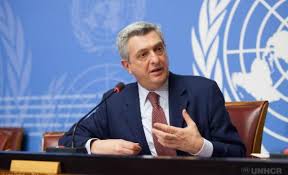
UNHCR calls for international solidarity to help migrants in Libya
 The UN High Commissioner for Refugees (UNHCR) has called for international solidarity to allow the distribution of refugees stranded in Libya to other countries.
The UN High Commissioner for Refugees (UNHCR) has called for international solidarity to allow the distribution of refugees stranded in Libya to other countries.
Welcoming the agreement with the African Union and Rwanda to set up a refugee transit mechanism for evacuation of vulnerable refugees out of Libya, UN High Commissioner for Refugees Filippo Grandi urged other countries to follow this example with further actions to save lives.
“At this critical time where people are being caught in the escalating conflict inside Libya and many endure appalling conditions in detention, refugees and asylum-seekers need hope and concrete solutions. We urgently need other countries to step forward to help in getting people out of harm’s way and offer solutions,” he said in a statement posted on the UN agency’s website.
More than 3,600 refugees and asylum-seekers are currently held in Libyan detention centers, many at risk of serious abuse and in peril from indiscriminate fighting. In early July, more than 50 refugees and migrants were killed in an airstrike on the Tajoura Detention Centre, east of Libya’s capital Tripoli. Across the country, conditions in detention centers are dire.
“Rwanda, and Niger – where a center for evacuated refugees from Libya has been operating for almost two years, helping us to secure solutions, including resettlement, for several thousand vulnerable people – are quietly demonstrating real responsibility sharing through the actions they are taking to protect people in great need. They offer hope to refugees, and should be inspiration to us all,” said Grandi.
Grandi also stressed the need for the international community to provide humanitarian corridors for refugees to be evacuated out of Libya and to make protection of the human rights both of refugees and migrants a core element of engagement in Libya.
UNHCR reiterates its view that refugees and migrants in detention in Libya should be freed in an orderly manner and their protection guaranteed. Vulnerable refugees and other individuals at risk should be evacuated to other countries from where resettlement and other solutions must be found without delay. Grandi also paid tribute to the 16 countries who have stepped up with offers of resettlement.
The UNHCR official in Libya, Jean-Paul Cavalieri, also commended the agreement concluded last week with Rwanda, for the temporary reception of African asylum-seekers from Libya.
“Of the 50,000 refugees registered with UNHCR in Libya, only 4,600 of them have been distributed to countries other than Libya,” Cavalieri said.
He added that about 3,000 of them were relocated to Niger, more than 800 to Italy, and 456 to Romania, in addition to 371 to other countries.
Under last week agreement, Rwanda will receive and provide protection to refugees and asylum-seekers evacuated from Libya. They will be transferred to safety in Rwanda on a voluntary basis. A first group of 500 is expected to include children and youth at risk. After their arrival in Rwanda, UNHCR will continue to pursue further solutions for the evacuees.
Evacuation flights are expected to begin in the coming weeks, and will be carried out in cooperation with the Rwandan and Libyan authorities. The African Union will provide assistance with evacuations, strategic political support with training and coordination, and help to mobilize resources. UNHCR will provide protection services and necessary humanitarian assistance including food, water, accommodation, education and healthcare.
Meanwhile, the World Health Organization (WHO) announced on Monday, the dispatch of medical supplies to people in remote areas near Ubari town, southwest of Libya, in coordination with the UN’s Central Emergency Response Fund (CERF).
The WHO explained via Twitter that they have delivered recently medical supplies through the Libyan authorities to treat around 220,000 patients for three months.
The medical aid included treatment for infections, injuries and chronic diseases.
